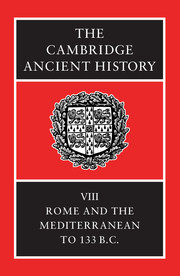Book contents
- Frontmatter
- Contents
- List of maps
- List of text-figures
- Preface
- 1 Sources
- 2 The Carthaginians in Spain
- 3 The Second Punic War
- 4 Rome and Greece to 205 B.C.
- 5 Roman expansion in the west
- 6 Roman government and politics, 200-134 B.C.
- 7 Rome and Italy in the second century B.C.
- 8 Rome against Philip and Antiochus
- 9 Rome, the fall of Macedon and the sack of Corinth
- 10 The Seleucids and their rivals
- 11 The Greeks of Bactria and India
- 12 Roman tradition and the Greek world
- 13 The transformation of Italy, 300 – 133 B.C. The evidence of archaeology
- Three Hellenistic Dynasties
- Genealogical Tables
- Chronological Table
- BIBLIOGRAPHY
- Index
- Map 11: Greece and Asia Minor
- Map 13: Asia Minor and Syria
- References
1 - Sources
Published online by Cambridge University Press: 28 March 2008
- Frontmatter
- Contents
- List of maps
- List of text-figures
- Preface
- 1 Sources
- 2 The Carthaginians in Spain
- 3 The Second Punic War
- 4 Rome and Greece to 205 B.C.
- 5 Roman expansion in the west
- 6 Roman government and politics, 200-134 B.C.
- 7 Rome and Italy in the second century B.C.
- 8 Rome against Philip and Antiochus
- 9 Rome, the fall of Macedon and the sack of Corinth
- 10 The Seleucids and their rivals
- 11 The Greeks of Bactria and India
- 12 Roman tradition and the Greek world
- 13 The transformation of Italy, 300 – 133 B.C. The evidence of archaeology
- Three Hellenistic Dynasties
- Genealogical Tables
- Chronological Table
- BIBLIOGRAPHY
- Index
- Map 11: Greece and Asia Minor
- Map 13: Asia Minor and Syria
- References
Summary
INTRODUCTION
The period covered by this volume saw a vast expansion of Roman power, an expansion which extended Roman military and political domination over virtually the entire Mediterranean world, from west to east, from Spanish tribes to Hellenistic kingdoms. At the beginning of the period the cities, leagues and kingdoms of the Hellenistic world which lay to the east of the Adriatic lived a largely separate existence, as yet barely touched by Rome; by the end, although (except in Macedonia) the imposition of Roman administration still lay in the future, effective Roman political control was an established fact. This outcome had a profound influence upon the nature of the literary sources which yield both the framework and much of the detail of our knowledge; for the greater part of them have Rome at the centre of their interest and show us the rest of the Mediterranean peoples, both of the west and of the east, primarily in relationship to Rome. Thus although in the western lands there is much archaeological evidence, revealing military constructions, habitations, and a multitude of artifacts, the historical context to which this has to be related is almost entirely Roman. In the east, though the nature of the material is somewhat more complicated, it is still difficult to build up independently of Roman affairs a picture which has much coherence and detail, even for the early part of the period. Admittedly some help can be obtained here from the considerable body of numismatic and of epigraphic evidence. The evidence of coins is particularly useful in resolving a number of chronological problems, especially in connection with some of the dynasts and usurpers whose reigns were short, while for certain of the more remote Hellenistic kingdoms it is fundamental; and the survival of numerous inscriptions, especially inscriptions erected by Hellenistic cities, casts many shafts of light – usually narrow but often intense – upon matters of chronology, political allegiance, administration and royal policies.
Keywords
- Type
- Chapter
- Information
- The Cambridge Ancient History , pp. 1 - 16Publisher: Cambridge University PressPrint publication year: 1989

